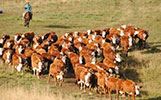| Growsafe Systems Demonstrates the Value of Data in Increasing Herd Efficiency
Reducing Greenhouse Gas (GHG) emissions through selection for efficient cattle and optimized production time offers significant opportunity to reduce livestock's environmental footprint. Building on extensive research, technology development and industry investment a project co–funded by the Carbon Credit Emissions Management Corporation and GrowSafe Systems Ltd. is demonstrating how an advanced data analytics platform can be used to improve operation profitability and reduce emissions. With participation from livestock producers from the United States, Canada, Australia, Mexico, Brazil, Africa and the EU and researchers from the University of Missouri, Texas A and M, and UC Davis this project will demonstrate at a commercially relevant scale how an advanced analytics platform can monitor, audit and verify GHG emissions on a life cycle basis. View Project Video (3:48)
Jolley: Five Minutes with John Butler and the U.S. Roundtable on Sustainable Beef
Chuck Jolley, Drovers | August 3, 2016
This year, John Butler of the Beef Marketing Group, heads up a gang of beef industry heavyweights as the U.S. Roundtable on Sustainable Beef begins its second year of getting an often factious group of stakeholders to come together and create a working definition of sustainable beef practices.
The group includes Chair Elect, Rickette Collins, McDonald's Corporation; Secretary/Treasurer, Mark Shaw, Micro Technologies; Ben Weinheimer, Texas Cattle Feeders Association; Todd Armstrong, Elanco Animal Health; Kim Stackhouse–Lawson, PhD., JBS USA; last year's interim president, Nicole Johnson–Hoffman, Cargill; Alisha Staggs, Walmart; Nancy Labbe; World Wildlife Fund and Chad Ellis, Noble Foundation.
Marfrig Wants to Be 'Global Leader' in Environmental Sustainability 
Oscar Rousseau, Global Meat News | July 28, 2016
Marfrig is one of the largest meat companies in Brazil and has radically changed how it produces beef to halt the deforestation of South America and protect the environment. The business has recently launched a line of meats produced in line with top sustainability production practices and is working on building a responsible ranching model in the Amazon to promote sustainable farming.
Certified Angus Beef LLC to Receive Don L. Good Impact Award 
Drovers | July 27, 2016
Certified Angus Beef LLC, the world's largest and most successful branded beef program, has been selected to receive the 2016 Don L. Good Impact Award. With nearly four decades of leadership in the beef business, the CAB brand in fiscal 2015 reported record sales for the ninth consecutive year, marketing 896 million pounds of product.
The award, presented by the Livestock and Meat Industry Council Inc., is named in honor of Good, who is a former head of the Kansas State University Department of Animal Sciences and Industry, and recognizes positive impact on the livestock and meat industry or agriculture.
One Strong Future 
Amy Sandys, Transform Magazine | July 29, 2016
Dutch–owned supermarket group, Ahold was established in 1887; Belgian–owned supermarket group, Delhaize, in 1867. Back in June 2015, the companies announced the intention to merge. In July 2016, $29bn later, this expectation became a reality.
Annual sales of the group reach around $50bn per year, and each week it serves around 50mn customer across 11 countries through 22 local brands. The newly–named Ahold Delhaize therefore required a strong visual and corporate identity to remain a leader in retail experience.
Cargill Aiming to Model the Effect of Antibiotics
Jane Bryne, Feed Navigator | August 2, 2016
FeedNavigator: How have insights that the Cargill team has gleaned around how antibiotic growth promoters (AGPs) work influenced R&D efforts in optimizing gut health in mongastrics, ruminants and fish?
CAN: Cargill's animal nutrition business has learned AGPs have modes of action other than working simply as anti–microbial agents. As a result, we took a more comprehensive approach. Our strategy is to look at AGP effects from several different angles: microbial, immune, gut integrity and function, and metabolic. We then identify biomarkers that can be used to describe, evaluate and model the effect of antibiotics. At this moment, we are modeling the effects in poultry and applying the learnings in pigs before expanding to other animal species. | |
